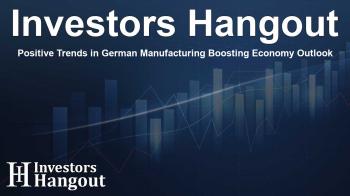Positive Trends in German Manufacturing Boosting Economy Outlook

Positive Trends in German Manufacturing
Recent data from Germany is consistently surpassing expectations, sparking optimism about the Eurozone's economic performance. This development is crucial for both the local and broader European economy.
Industrial Orders on the Rise
The industrial orders index for Germany saw an impressive increase of 6.9% in December, effectively balancing out a previous 5.2% decline in November. Although there is a year-on-year decline of 6.3%, the index has experienced a recovery of over 10% since reaching its lowest point in May last year. This uptick, though encouraging, remains subject to fluctuations.
Stabilizing Production Index
In a parallel trend, the industrial production index is starting to show signs of recovery as well. While it experienced considerable volatility at the end of the previous year, recent trends indicate a more stable outlook moving forward.
PMI Index Shows Encouraging Data
Earlier this week, the Purchasing Managers' Index (PMI) also reported positive adjustments. Notably, the manufacturing PMI has lingered below the level of 50 for a continuous stretch of 31 months. Yet, thanks to the robust performance of the services sector, the composite PMI index has transitioned into growth after previously residing below the critical benchmark.
Shifts in Economic Sentiment
The German economy is in the midst of significant changes, including an uptick in the unemployment rate. However, despite these challenges, there are increasing signs of optimism among businesses as many firms report a more favorable outlook. This renewed confidence could play a pivotal role in bolstering the euro's strength in the upcoming weeks.
Conclusion
As Germany continues to adapt and navigate through its current economic landscape, the upward momentum in manufacturing and other sectors offers hope for further recovery. These trends will likely contribute positively to the overall economic stability of the Eurozone.
Frequently Asked Questions
What are the current trends in German manufacturing?
German manufacturing is experiencing positive trends, with industrial orders and production showing signs of recovery after previous declines.
What was the increase in the industrial orders index for December?
The industrial orders index increased by 6.9% in December, offsetting the previous month's decline.
How long has the manufacturing PMI been below 50?
The manufacturing PMI has been below 50 for 31 consecutive months.
What factors are influencing the increasing optimism among German businesses?
Improving data in production and orders, along with positive adjustments in the PMI, are contributing to increased optimism among businesses.
How might the economic changes in Germany affect the Euro?
The signs of recovery and optimism in the economy could provide crucial support for the euro in the near future.
About The Author
Contact Dylan Bailey privately here. Or send an email with ATTN: Dylan Bailey as the subject to contact@investorshangout.com.
About Investors Hangout
Investors Hangout is a leading online stock forum for financial discussion and learning, offering a wide range of free tools and resources. It draws in traders of all levels, who exchange market knowledge, investigate trading tactics, and keep an eye on industry developments in real time. Featuring financial articles, stock message boards, quotes, charts, company profiles, and live news updates. Through cooperative learning and a wealth of informational resources, it helps users from novices creating their first portfolios to experts honing their techniques. Join Investors Hangout today: https://investorshangout.com/
The content of this article is based on factual, publicly available information and does not represent legal, financial, or investment advice. Investors Hangout does not offer financial advice, and the author is not a licensed financial advisor. Consult a qualified advisor before making any financial or investment decisions based on this article. This article should not be considered advice to purchase, sell, or hold any securities or other investments. If any of the material provided here is inaccurate, please contact us for corrections.

